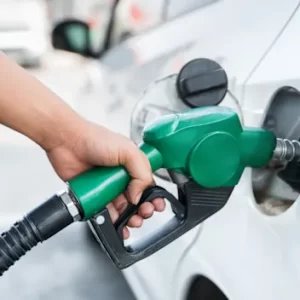Table of Contents
Despite last week’s price increase, the Federal Government is still struggling to restore a stable supply of Premium Motor Spirit (PMS), commonly known as petrol. Long queues and the black market for fuel remain widespread across Nigeria.


Investigations by Vanguard revealed that many petrol stations in Lagos, Abuja, and surrounding areas are still closed. Independent marketers have not received adequate supplies, and major marketers are running out of stock due to overwhelming demand. As a result, petrol prices remain significantly higher than the new pump price of N855 per liter, with independent marketers selling fuel between N900 and N1,000 per liter. In some areas on the outskirts of Lagos, prices have exceeded N1,000 per liter. Black market sellers in both Lagos and Abuja are charging between N1,200 and N1,400 per liter.

Join our Telegram Channel for Updates
Government Defends PMS Policy
President Bola Tinubu defended the removal of fuel subsidies, stating that the policy aims to free up resources for critical infrastructure and social services investments. Speaking at the Chartered Institute of Bankers of Nigeria (CIBN) conference, Vice-President Kashim Shettima, representing Tinubu, emphasized that the government’s economic reforms are focused on reducing inflation, stabilizing foreign exchange, and improving fiscal management.
Plans to Boost Supply
Minister of Finance Wale Edun assured that starting in September, the government would supply 25 million liters of petrol through the Dangote Refinery to ease transportation costs. He also mentioned plans to invest in biofuel buses and compressed natural gas (CNG) conversion kits, acknowledging that food inflation remains a serious issue.
Reasons for Petrol Shortages
Tunji Oyebanji, Managing Director of 11Plc, explained that long queues persist because consumers lack confidence in the stability of petrol supply. However, he noted that if supplies remain steady, the queues should disappear soon. Petroleum marketers acknowledged a nationwide supply gap, partly due to the failure of the Dangote Refinery and NNPC Limited to agree on off-taker prices for petrol.
Alhaji Abubakar Maigandi Shettima, President of the Independent Petroleum Marketers Association of Nigeria (IPMAN), revealed that marketers are struggling to secure additional funds to load fuel trucks. He emphasized the need for a quick resolution to the off-taker price issue, warning that independent marketers might need to negotiate directly with Dangote Refinery if the situation persists.
Experts Suggest Solutions
Industry experts, including Mazi Colman Obasi, President of the Oil and Gas Service Providers Association of Nigeria (OGSPAN), urged the government to increase petrol supply on a sustainable basis and encouraged the public to avoid panic buying. Another expert recommended that the government address the challenges affecting supply from the Dangote Refinery and ensure practical deregulation to encourage more participation in the downstream sector.
In response to the crisis, NNPC Executive Vice-President Adedapo Segun emphasized that fuel prices should fluctuate based on market conditions, as outlined in the Petroleum Industry Act (PIA). He explained that fuel prices should adjust according to seasonal and market changes, similar to global trends.









